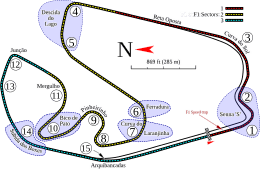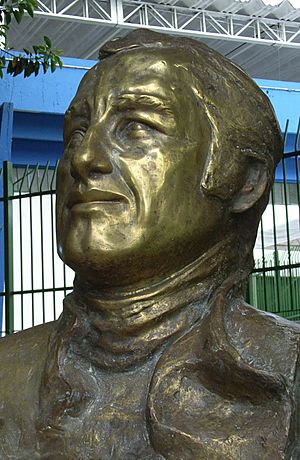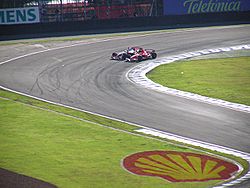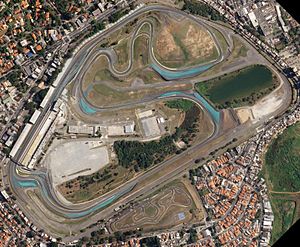Interlagos Circuit facts for kids

Grand Prix Circuit (5th Variation) (1999–present)
|
|
| Location | Interlagos, São Paulo, Brazil |
|---|---|
| Time zone | UTC−03:00 |
| Coordinates | 23°42′4″S 46°41′50″W / 23.70111°S 46.69722°W |
| Capacity | 60,000 |
| FIA Grade | 4 |
| Broke ground | 1938 |
| Opened | 12 May 1940 |
| Former names | Autódromo de Interlagos (1940–1984) |
| Major events | Current: Formula One Brazilian Grand Prix (1972–1977, 1979–1980, 1990–2019) São Paulo Grand Prix (2021–present) FIA WEC 6 Hours of São Paulo (2012–2014, 2024–present) TCR South America (2021–present) Stock Car Pro Series (1979–present) Mil Milhas Brasil (1956–1961, 1965–1967, 1970, 1973, 1981, 1983–1990, 1992–1996, 1998, 2001–2008, 2020–present) Former: Grand Prix motorcycle racing Brazilian motorcycle Grand Prix (1992) TCR World Tour (2024) World Series by Nissan (2002) SASTC (1997–1999) TC2000 (2007) |
| Grand Prix Circuit (5th Variation) (1999–present) |
|
| Length | 4.309 km (2.677 mi) |
| Turns | 15 |
| Race lap record | 1:10.540 ( |
| Stock Car Circuit with Chicane (2011–2017) | |
| Length | 4.314 km (2.681 mi) |
| Turns | 17 |
| Race lap record | 1:40.066 ( |
| Grand Prix Circuit (4th Variation) (1996–1998) |
|
| Length | 4.292 km (2.667 mi) |
| Turns | 15 |
| Race lap record | 1:18.397 ( |
| Grand Prix Circuit (3rd Variation) (1990–1995) |
|
| Length | 4.325 km (2.687 mi) |
| Turns | 15 |
| Race lap record | 1:18.455 ( |
| Motorcycle Circuit (1992) | |
| Length | 4.352 km (2.705 mi) |
| Turns | 17 |
| Race lap record | 1:42.872 ( |
| Grand Prix Circuit (2nd Variation) (1980–1989) |
|
| Length | 7.873 km (4.893 mi) |
| Turns | 26 |
| Race lap record | 2:27.311 ( |
| Original Grand Prix Circuit (1940–1979) | |
| Length | 7.960 km (4.946 mi) |
| Turns | 26 |
| Race lap record | 2:28.76 ( |
The Autódromo José Carlos Pace, often called Interlagos, is a famous race track in São Paulo, Brazil. It's 4.309 kilometers (about 2.677 miles) long. This track opened on May 12, 1940. In 1985, it was renamed to honor José Carlos Pace, a Formula 1 driver who passed away in 1977. The track runs in a special counterclockwise direction. It also has a kart track named after the legendary driver Ayrton Senna.
Interlagos has hosted the exciting Formula One Brazilian Grand Prix since 1973. The track has also seen other big races. These include the Brazilian motorcycle Grand Prix in 1992 and the FIA World Endurance Championship from 2012 to 2014. Many national championships, like Stock Car Brasil, also take place here.
Besides racing, Interlagos has hosted other events. The Prova Ciclística 9 de Julho cycling race was held here for many years. Since 2014, a local version of the Lollapalooza music festival has also taken over the venue.
Contents
The Story of Interlagos

The land where the circuit now stands was first bought in 1926. Developers wanted to build homes there. But after some problems, including the Wall Street crash of 1929, they decided to build a race track instead. Construction began in 1938, and the track opened on May 12, 1940. Its design was inspired by famous tracks in the United States, England, and France.
The name "Interlagos" means "between lakes" in Portuguese. This is because the track is located between two large artificial lakes. These lakes, Guarapiranga and Billings, were built to provide water and electricity to São Paulo. In 1985, the track was renamed "Autódromo José Carlos Pace". This was a tribute to the Brazilian Formula One driver, also known as "Moco". He died in a plane crash in 1977.
Formula One first raced at Interlagos in 1972. The first official World Championship Brazilian Grand Prix was in 1973. It was won by local hero Emerson Fittipaldi. José Carlos Pace himself won his only race at Interlagos in 1975.
The original track was very long, about 7.960 kilometers (4.946 miles). Drivers found it bumpy and some parts were not very safe. Because of these safety worries, Formula One stopped racing at Interlagos in 1980. The races moved to a different track in Rio de Janeiro. Formula One returned to Interlagos in 1990. The track had been shortened and made much safer. Since then, the track layout has mostly stayed the same.
Interlagos is known for exciting Formula One races. Especially since 2004, when it became one of the last races of the season. Many championships have been decided here. For example, Fernando Alonso won his world titles in Brazil in 2005 and 2006. In 2008, Felipe Massa almost won the championship at Interlagos. But Lewis Hamilton passed another driver on the very last lap to take the title.
In 2023, strong winds from a storm caused a roof at the complex to come off.
A Special Tribute to José Carlos Pace
In August 2024, something very special happened at Interlagos. The body of José Carlos Pace was moved to the race circuit. He was laid to rest at the track named after him. This idea came from the head of the Brazilian Automobile Confederation.
Pace's family, friends, and other drivers attended an emotional ceremony. His son, Rodrigo, drove a 1967 Karmann-Ghia racing car. This was a car his father used to race. José Carlos Pace is the first driver ever to be buried at a race circuit.
What Makes Interlagos Special
Interlagos is unique because it's not flat. It follows the natural hills and dips of the land. This makes it a challenging track for drivers and cars. Cars need more power, and drivers get a tougher workout. Also, it runs counterclockwise, which is different from most F1 tracks. This pushes drivers' necks to the right, instead of the usual left. The hilly course is also great for cycling events.
The weather at Interlagos can also be very unpredictable. Sudden rain showers are common, from light drizzles to heavy storms. This adds excitement and uncertainty to the races. São Paulo, the city where the track is, is even called the "Land of the Drizzle."
Track Improvements Over Time
The track has been updated many times to make it better and safer. In 1979, the pit lane was changed. In 1990, the original long track was shortened from 7.873 kilometers (4.893 miles) to 4.325 kilometers (2.687 miles). This removed many fast, dangerous corners. The new track still had a long, fast section, but it was much safer.
In 2007, major repairs were done. The old asphalt was completely replaced, making the track much smoother. The pit lane entrance was also improved for safety. The circuit was closed for five months for all this work. A new train station, "Autódromo," also opened nearby in 2007. This made it much easier for people to get to the track.
More upgrades were planned in 2012, including a new pit building. The pit lane itself is one of the longest in Formula One. It has been changed several times to make it safer for drivers entering and exiting.
Exploring the Track Layout

Let's take a tour of the Interlagos track, starting from the "Tribunas" section:
- The race begins on a long, uphill straight.
- Then comes the "S do Senna" (Senna S) [1,2]. These are two quick turns, first left, then right, going downhill.
- The "S do Senna" leads into "Curva do Sol" (Curve of the Sun) [3]. This is a wide, left-hand turn.
- After that, you hit "Reta Oposta" (Opposite Straight). This is the longest straight section of the track.
- Next are "Descida do Lago" (Lake's Descent) [4,5]. These are two downhill left turns. They lead to a short straight that goes uphill.
- The track then enters a slower, twisty part. "Ferradura" (Horseshoe) [6,7] is a downhill right turn.
- This leads to "Laranjinha" (Little Orange) [8], another right turn and the slowest part of the track.
- Then comes "Pinheirinho" (Little Pine Tree) [9], a left turn on flat ground.
- "Bico de Pato" (Duck Bill) [10] is a tight, hairpin-like right turn.
- "Mergulho" (Dive) [11] is a smooth left turn. It sends drivers straight into "Junção" (Junction) [12], a harder left turn.
- Turn [13] "Café" (Coffee) is an uphill left bend. This marks the start of a long, high-speed section.
- "Subida dos Boxes" (Up to the Pits) [14] is a long, uphill left turn. It's very demanding on the car's engine.
- Finally, "Arquibancadas" (Bleachers) [15] is a wide, fast left turn. It connects back to the "Tribunas" straight, completing the lap.
The series of left turns from "Junção" all the way to Turn 1 is often taken at full speed. This part is one of the longest full-throttle sections in Formula 1. It really tests the car's engine.
Here are the names of the corners:
- 'S' do Senna (Senna S) (1,2)
- Curva do Sol (Curve of the Sun) (3)
- Descida do Lago (Lake's Descent) (4,5)
- Ferradura (Horseshoe) (6,7)
- Laranjinha (Little Orange) (8)
- Pinheirinho (Little Pine Tree) (9)
- Bico de Pato (Duck's Bill) (10)
- Mergulho (Dive) (11)
- Junção (Junction) (12)
- Café (Coffee) (13)
- Subida dos Boxes (Up to the Pits) (14)
- Arquibancadas (Bleachers) (15)
Track Layout Changes Over Time
- Interlagos Circuit Layout History
Major Events at Interlagos
Interlagos hosts many exciting races and events throughout the year.
- Current Events
- Mil Milhas Brasil (January)
- Fórmula Truck (February)
- Stock Car Pro Series (May, December)
- Copa Truck (May, December)
- NASCAR Brasil Series (May, December)
- FIA World Endurance Championship 6 Hours of São Paulo (July)
- Formula One São Paulo Grand Prix (November)
- TCR South America Touring Car Championship (December)
- Past Events
- Formula One Brazilian Grand Prix (1972–1977, 1979–1980, 1990–2019)
- Grand Prix motorcycle racing Brazilian motorcycle Grand Prix (1992)
- International Touring Car Championship (1996)
- FIA GT1 World Championship (2010)
- Prova Ciclística 9 de Julho (2002–2006, 2008–2013)
- TCR World Tour (2024)
Images for kids
-
The first corner is the most popular overtaking spot. Michael Schumacher (red car) passes Kimi Räikkönen at the 2006 Brazilian GP.
See also
 In Spanish: Autódromo José Carlos Pace para niños
In Spanish: Autódromo José Carlos Pace para niños
- Cidade Dutra
- Socorro
- Roman Catholic Diocese of Santo Amaro
- Subprefecture of Capela do Socorro








